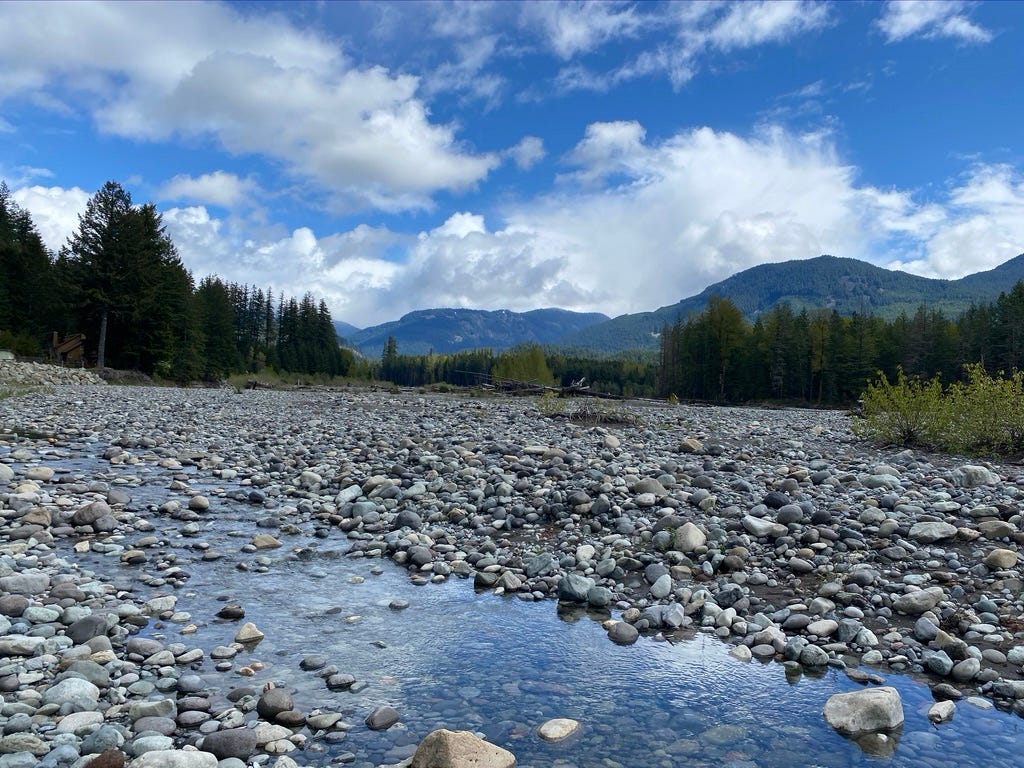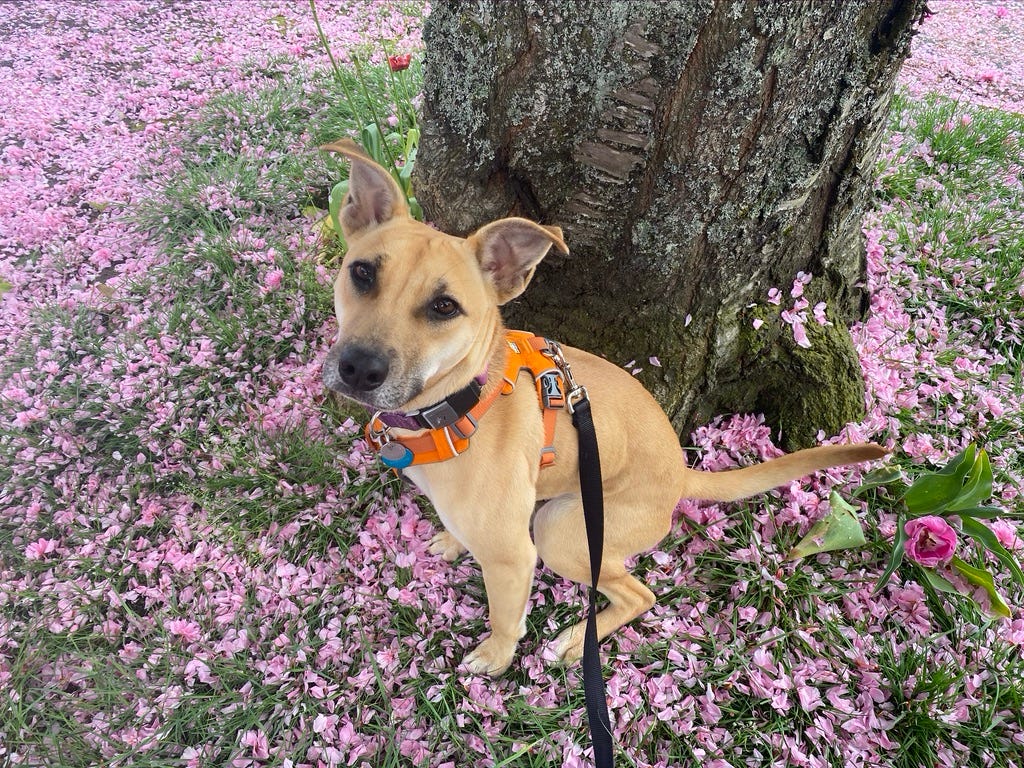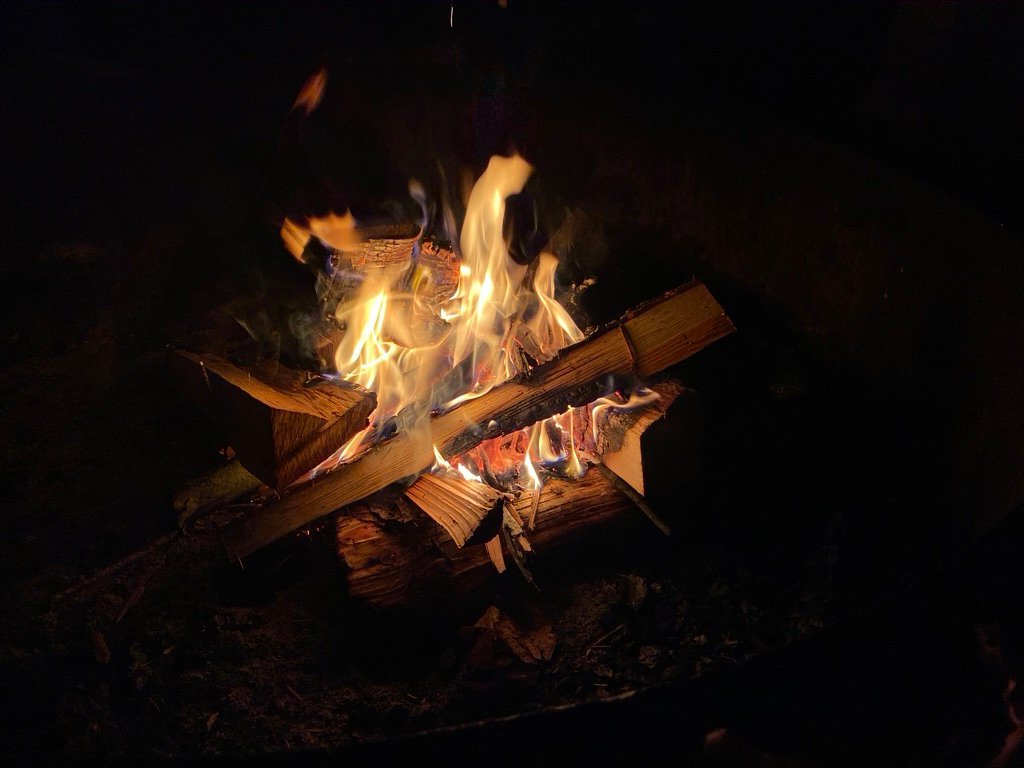Owning a young dog has caused me to feel all sorts of things I never expected to feel. The joys and the frustration I was prepared for, at least abstractly. But I’m amazed at how quickly I’ve begun to feel hopelessly and permanently attached. With that, of course, comes the terror of loss, a feeling that has gripped me at odd intervals over the past month as this new creature has bumbled her way into my life.
The place we got her has a very reasonable standard five-day trial adoption period. At the end of that stretch you either sign the papers and keep the dog or become a foster until the next home can be found. I don’t think it took my wife and I more than five minutes to understand that there was no future in which we would want this dog to leave our lives. Whatever heartaches and messes might come, neither of us could contemplate that last car ride to some other home. In the seven weeks or so since that day the feeling has only intensified. the integration into our lives certainly has not been seamless, and some hours or days we are all exasperated and hopeless, the dog included.
But love is work, another one of those old truisms that got that way because it happens to be true. And I think one of the ways you take stock of what it is that you really love comes from contemplating what it would mean to lose it.
I have by all accounts led a very lucky life on this front compared to many people I know, compared to many people in my own family, who as Irish Catholics speak grief as fluently as a mother tongue. And I know what that means: that I will likely owe a few dozen or few hundred funerals and wakes and memorials down the line. Because this is the price of love, because this is something none of us can escape save for those who foreclose on the possibility of love, which is a death of its own sort.
Am I ready for that? I don’t know. Do I have a choice? I know I do not. And any theoretical alternative seems even more dreadful, and we’re all too far gone for that, anyway.
Around this time 14 years ago, as a high school junior, I experienced the first real and profound loss of my life. Two friends of mine, both seniors weeks away from graduation, were killed in a car accident. One of them, Josh, I had known since early childhood. Our families were close and our younger brothers were best friends; to this day, his mom signs her texts to me “Mom 2.” (In the intervening years, his brother Louis has become like a brother to me, too.) Josh was the kind of kid who makes you look back on your teenage years with rose-colored glasses—the life of the party and a serious student who had plans to go to medical school. Someone for whom growing up wealthy had mostly manifested itself in a willingness to give anyone he met the shirt off his back. The rare “popular kid” who still had a kind word for everyone.
I had seen Josh for an instant the weekend before the crash. My mom was dropping me off at another friend’s house; Josh was turning out of the same street as we were pulling in. We saw each other clearly, however briefly. I don’t remember if we waved or nodded or what.
And then they were both gone, he and his classmate Kevin, a fact I learned on the bus on my way to school from a neighbor of mine who knew neither of them and reported it to the back seats as casually as you might report the weather. Whatever disbelief I allowed myself to lean on for the rest of the bus ride evaporated the instant we got to school, where the weight of shock and grief thickened the air until it felt hard to walk.
I could go on for pages dwelling on these feelings. I suspect they are not new to any of you, in your own ways. But no cosmic rule says that our grief must be the only memory we keep, and here a decade and a half later it is easier to choose to remember the love that was the necessary precondition for the grief rather than that debilitating, all-consuming sadness itself.
Here is what I remember: Riding with Josh to a concert a few months before the accident, one of the first times I’d been allowed to ride with a friend, and feeling on top of the world. Josh giving a wad of money from his wallet to a homeless guy on the street outside the show. (Matisyahu, featuring State Radio and Kenny Muhammad, “The Human Orchestra.”) Dancing in the crush of people on the floor of the Landmark Theater, the spotlights catching the pot smoke filling the air overhead.
Here is what I remember: a time before you could even comment on Facebook posts, when it was like MySpace, so that what remains of the proof of my friendship with Josh is a series of scattered semi-sequiturs and inside jokes missing half their connections.
Here is what I remember: putting on dark clothes and eyeblack and “war paint” with Josh and a dozen other friends, sneaking onto a nearby golf course, and playing hours-long games of Capture the Flag for which we were all eventually cited for trespassing. Are there any friends like the friends who you first got in trouble with?
Despite what we all suspect as teenagers, none of us lives forever. But I have to believe that a part of us lives on in all the love we leave behind, which is as good a reason as any to leave as much of it as you can.
This is like the fifteenth one of these newsletters about love and death and their inextricability—the latter being the only thing that ultimately gives the former its meaning. I’d apologize but I’m not really sorry. It’s just that having this sweet and goofy and fragile new being in my world has made me take stock of just how much we become responsible for when we choose to let love into our lives.
I will leave you with a poem from Rilke—“Go to the Limits of Your Longing”—that captures some of my feelings about this in far fewer words than I ever could.
God speaks to each of us as he makes us,
then walks with us silently out of the night.These are the words we dimly hear:
You, sent out beyond your recall,
go to the limits of your longing.
Embody me.Flare up like a flame
and make big shadows I can move in.Let everything happen to you: beauty and terror.
Just keep going. No feeling is final.
Don’t let yourself lose me.Nearby is the country they call life.
You will know it by its seriousness.Give me your hand.
Thanks, as always, for reading. I’ll talk to you next week.
-Chuck
PS - Huge thanks to Louis for allowing me to write this piece and checking in with me about it. Lou, you are a brave & kind soul and I’m lucky to have you in my life.







